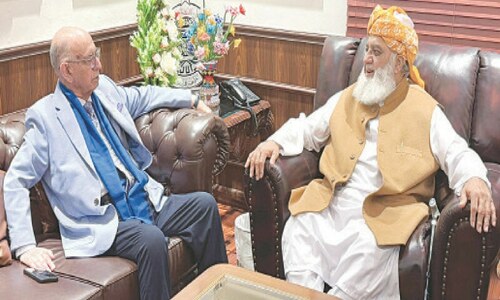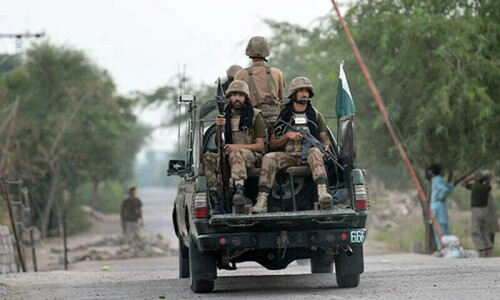TUNIS: Arab leaders, long divided by regional rivalries, condemned on Sunday a US decision to recognise Israel’s sovereignty over the Golan Heights and said the stability of Middle East depended on creating a Palestinian state.
Arab leaders, gathering for a summit in Tunis, have been under popular pressure to reject Washington’s action, while they also grapple with regional differences, including a bitter Gulf Arab dispute, splits over Iran’s regional influence, the war in Yemen and unrest in Algeria and Sudan.
The abrupt departure from the summit of Qatari Emir Sheikh Tamim bin Hamad al-Thani, who is locked in a row with Saudi Arabia and other Arab allies, suggested regional differences were not easily buried. No reason was given for his departure.
Saudi Arabia’s King Salman bin Abdulaziz told Arab monarchs, presidents and prime ministers at the meeting that his country “absolutely rejects” any measures affecting Syria’s sovereignty over the Golan Heights.
President Donald Trump signed a proclamation last week recognising the Golan Heights as part of Israel, which annexed the area in 1981 after capturing it from Syria in 1967.
Tunisian president calls for establishment of Palestinian state
The Saudi king’s condemnation echoed those of Arab officials before Sunday’s summit of the Arab League, which usually ends with a final declaration agreed by the 22 member states.
Trump’s Golan decision followed a US move less than four months ago to recognise occupied Jerusalem as Israel’s capital, a decision that also drew Arab condemnation. Palestinians want East Jerusalem as the capital of a future state.
Tunisian President Beji Caid Essebsi said Arab leaders also needed to ensure that the international community understood the importance of the Palestinian cause to Arab nations.
Regional and international stability should come through “a just and comprehensive settlement that includes the rights of the Palestinian people and leads to the establishment of a Palestinian state with Jerusalem as its capital,” Essebsi said.
UN Secretary-General Antonio Guterres, who addressed the meeting, said any resolution to the Syrian conflict must guarantee the territorial integrity of Syria “including the occupied Golan Heights”.
Rifts remain
The Tunis summit brought together the rulers of Saudi Arabia and Qatar for the first time since 2017 when Riyadh and its allies imposed a political and economic boycott on Doha.
But Qatar’s emir left the summit hall shortly after Arab League Secretary-General Ahmed Aboul Gheit praised the way Saudi Arabia handled its rotating Arab League presidency last year, live television footage showed.
Qatar’s state news agency did not say why Tamim left, but Tunisia’s state news agency TAP said the rest of Qatar’s delegation stayed.
Saudi Arabia, the United Arab Emirates, Bahrain and Egypt accuse Qatar of supporting terrorism and say it has been cosying up to Iran, a charge Doha denies.
The row has defied mediation efforts by Kuwait and the United States, which urged the Gulf Arab states to unite in opposition to Iranian influence in the region.
King Salman, whose country has long vied with Iran for influence, called for confronting what he called the “aggressive policies of the Iranian regime”. He said Iran was interfering in Arab affairs, a charge Tehran dismisses.
Arab states remain divided over other issues as well, including how to deal with pro-democracy protests that have erupted in the region since 2011.
The leaders of Sudan and Algeria did not attend Sunday’s meeting as both nations have been roiled by anti-government protests.
Syria’s seat at the summit was also vacant. Damascus has been suspended from the League since 2011 over its crackdown on protesters at the start of its civil war. The League has said no consensus has yet been reached to allow Syria’s reinstatement.
Published in Dawn, April 1st, 2019















































Dear visitor, the comments section is undergoing an overhaul and will return soon.